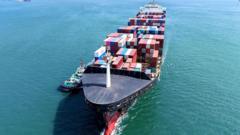The IMF has revised down its global growth projections, primarily due to rising trade tariffs imposed by the US and their resultant impact on economic uncertainty. While the US growth forecast has been cut to 1.8%, the UK is expected to grow by 1.1%, though both are now subject to inflationary pressures. The IMF highlights that uncertainty around trade policy remains a key factor affecting firm investment decisions worldwide.
IMF Lowers Global Growth Outlook Amid Trade Tariff Concerns

IMF Lowers Global Growth Outlook Amid Trade Tariff Concerns
The International Monetary Fund (IMF) adjusts its economic forecasts due to increasing trade tariffs, particularly affecting the US and UK economies.
The International Monetary Fund (IMF) has significantly revised its global economic growth forecasts, primarily due to the escalating impacts of trade tariffs introduced by the US. The forecast for US economic growth has been downgraded from 2.7% to 1.8% for this year, marking the largest decline among advanced economies.
The Fund warns that increasing tariffs and associated uncertainties are likely to result in a considerable "slowdown" of global economic activity. The growth outlook for the United Kingdom has also been adjusted downward to 1.1%. Notably, despite this reduction, the IMF predicts that the UK economy will outperform those of Germany, France, and Italy in relative growth terms.
Inflation levels in the UK are anticipated to reach 3.1%, the highest among advanced economies, driven by surging costs for utilities and essential services. This forecast comes as leading economic policymakers convene in Washington for the spring sessions of the IMF and the World Bank. According to Pierre-Olivier Gourinchas, the IMF's chief economist, the global economy is still reeling from substantial shocks over the past four years and is once again "severely tested."
This downturn in economic forecasts follows President Donald Trump's aggressive trade policy stance, which has seen the imposition of new tariffs on various goods. The US has enacted tariffs as high as 145% on selected Chinese imports, with China responding with 125% tariffs on US goods. Moreover, a 10% tariff applies to a broad array of products from other nations, with higher tariffs temporarily on hold for numerous countries. Trump asserts that such tariffs will promote domestic consumption of American products, increase tax revenues, and spur investments in the US economy.
However, the IMF cautions this policy could severely disrupt global trade due to the interconnected nature of modern supply chains. Mr. Gourinchas noted that rising uncertainty around trade policies is a significant contributor to the downward adjustment of growth estimates.
Many companies may respond to these uncertainties by curbing investments and purchases, leading to broader economic implications. The IMF envisions global growth at 2.8% for this year, a decline from the previously estimated 3.3%, and anticipates a growth of 3% for 2026.
The downgrade of US growth is attributed to increased policy unpredictability, trade tensions, and a more sluggish consumer spending landscape than anticipated. The risk of a US recession this year has reportedly risen to 40% from the previously assessed 25% last October.
In China, growth is expected to ease to 4% this year, down from earlier projections of 4.6%. For the UK, the downward adjustment reflects the ramifications of tariffs, increased government borrowing costs, and weakening consumer spending driven by elevated costs. Notably, the IMF's forecast for the UK economy in 2025 aligns more closely with growth predictions from the government’s Office for Budget Responsibility.
Chancellor Rachel Reeves asserted the UK's status as the fastest-growing country within the European G7, citing reform initiatives aimed at bolstering long-term growth. Conversely, Opposition's shadow chancellor Mel Stride criticized the outlook, arguing it indicates a lack of confidence in Labour’s economic policies.
The IMF's latest World Economic Outlook reveals additional growth forecasts indicating slower expansion within the eurozone and revisions for other advanced economies. It acknowledges the inherent unpredictability and various influences shaping economic outcomes, emphasizing that tariff dynamics continue to pose significant challenges to global economic stability.





















